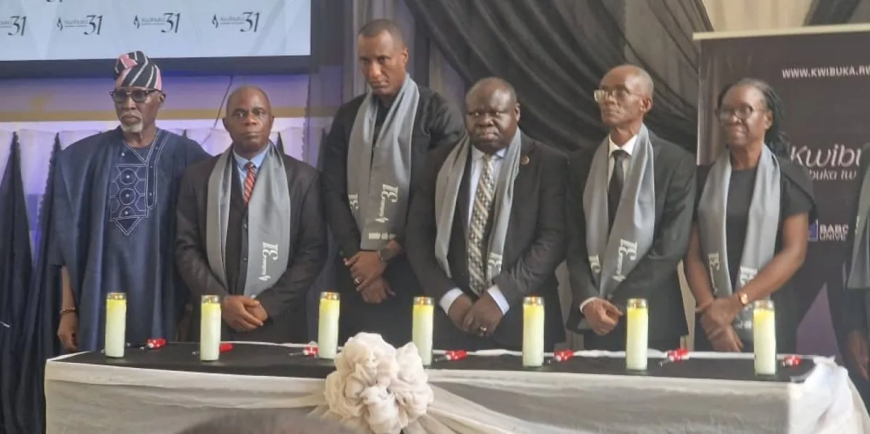1994 genocide: Rwanda envoy, Babcock VC sue for peace

High Commissioner of Rwanda in Nigeria, Ambassador Christophe Bazivamo, and the Vice Chancellor of Babcock University, Ilishan-Remo, Ogun, have sued for peace and unity among humanity, by placing values on human lives.
The duo, stated this in their remarks at the 31st commemoration of the 1994 genocide against the Tutsi in Rwanda, held at the 600-seater College of Health and Medical Sciences auditorium, of the University, on Wednesday.
Addressing the gathering which included top management team and students of Babcock University, the Rwanda Community in Lagos, and representatives of the Ilishan community, the envoy, disclosed that over one million Tutsi were massacred in the genocide, which was a result of culmination of decades of ethnically motivated discrimination, nurtured over time by colonial systems and later sustained by post-independence regimes.
He noted that the horror brought about by the April 7 genocide, marked the beginning of mourning in the country, but submitted that the mourning was not one that incapacitates, but one that spurred action and ignited purpose.
The envoy added, “It is crucial to understand that the 1994 Genocide against the Tutsi did not erupt spontaneously. It was the tragic culmination of decades of ethnically motivated discrimination, nurtured over time by colonial systems and later sustained by post-independence regimes.
Under colonial rule, our colonizer, Belgium, policies of social engineering introduced racial classifications and imposed hierarchies that systematically fractured Rwandan society. The role of certain missionary groups in entrenching these divisions is also part of our historical record.
The very seeds of the genocide were sown in this era of imposed division. These seeds were further cultivated by recurring cycles of violence, most notably including the unpunished killings of Tutsi people between 1959 and 1963.
“The absence of justice and accountability for these early atrocities often referred to as the “First Republic massacres” and largely overlooked by the international community, served as ominous and tragic signs of the unimaginable horrors that lay ahead.
In 1994, under the leadership of the then-president Juvénal Habyarimana and his political party, the MRND (Mouvement Révolutionnaire National pour le Développement), the Genocide against the Tutsi was systematically planned and carried out with the support of extremist militias and state institutions.
“In just 100 days between April and July 1994, over one million innocent men, women, and children—targeted because they were Tutsi—were slaughtered in one of the most horrific genocides in human history. Schools like this one were emptied of students and turned into places of horror, and indifference.
The world watched—and failed to act.”
Ambassador Bazivamo said the Rwanda Embassy in Nigeria chose to have the programme at a university by speaking directly to students, on the news to treat one another equally and build virile societies.
He charged them to challenge divisions and prejudice in any form, in any way, it rears its heads.
The envoy said the students are global citizens who must always be at the vanguard of promoting peace and harmony among fellow human beings.
“Our gathering today is not only about Rwanda—it is about all of us. It is about the future of Africa and the responsibility we share to protect it.
“Across our continent, we have seen how ethnic, religious, and political divisions have threatened peace and development. But we have also seen the promise of youth, the power of education, and the strength of unity.
Nigeria, like Rwanda, is a land of incredible diversity and potential. The lessons of Kwibuka are relevant here—because peace is not just the absence of war. It is the presence of justice, the protection of dignity, and the celebration of differences,” he added.
Prof Tayo, in his remarks, equally stressed the need for peaceful coexistence among brothers, tolerance, and utmost respect for human life across the divide to create a better world.
The Vice-Chancellor hinted that the country has made steady progress ever since towards unity and economic transformation, but prayed that never in history must such a calamity be allowed to befall the human race.
“As we come together to mark this occasion, I urge us all to focus on what unites us rather than what separates us. Let us reject the forces of division that seek to tear us apart based on racial, ethnic, gender, or other differences.
“We must strive for a world where such atrocities never happen again: a world where humanity is valued above all else; a world where we can live in peace, harmony, and mutual respect.
“By working together, we can help support the survivors, and the international community to promote peace, justice, and human rights worldwide.
“To achieve this, we must commit to promoting tolerance, understanding, and inclusivity. We must pledge to the continuing education of ourselves and others about the dangers of prejudice and the importance of empathy.
We must stand together against injustice and support those affected by violence and oppression,” he added.

 admin
admin 


